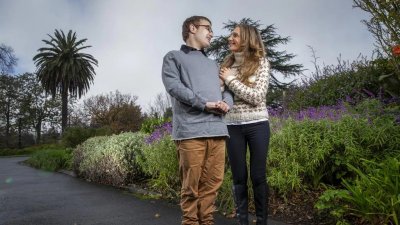Medicinal cannabis will be given to Victorian children with extreme behavioural problems to see if it can calm their conditions after showing promise during a Melbourne pilot study.
The world-first trial of cannabidiol is hoped to offer families the first effective alternative to antipsychotic medications, which can lead to devastating complications for their children, many of whom have autism.
It comes after a Murdoch Children’s Research Institute pilot study of eight children with severe behavioural conditions found a cannabis-derived medicine led to a clinically significant change in their irritability, aggression, self-injury, and yelling – without severe side effects.
Although the limited size of the pilot study is not enough to draw definitive conclusions about the impact of medicinal cannabis on extreme conditions, it’s success has convinced Federal Health Minister Greg Hunt to commit almost $900,000 for a major study involving 140 Victorian and NSW children beginning later this year.
Having seen the impact cannabidiol has for vulnerable patients during his preliminary study, the MCRI’s Associate Professor Daryl Efron said he was hopeful of being able to offer families relief from conditions as well as their medications in the future.
“It is very encouraging,” Assoc Prof Efron said.
“The cannabis has a signal that it might be affective.
“Equally important, the side-effect profile seems to be very mild and in our study there was hardly any.
“My expectation is that over time it will become not a miracle drug, but another medication that will be really helpful for these kids with fewer side effects than the current medications that we use.
“We are crying out for novel drugs. They have got hellish lives and it is hell for their families, so we really hope that this will be an important difference to their health care.”
Results of the pilot study published on Thursday in the British Journal of Clinical Pharmacology show children aged 8-16 years – most of whom also have autism – treated with medicinal cannabis experienced clinically significant reductions in their irritability, aggression, self-injury and yelling, compared to those taking a placebo.
Unlike current antipsychotics and antidepressants medications – which commonly cause weight gain, metabolic syndrome, cognitive impairments and mood swings – the cannabidiol was well tolerated in each case.
Since he was just six Sebastian O’Leary, now 18, has been on medications to try and control his agitation, anxiety and overall emotional deregulation.
But for his mother Retanne the choice between controlling her autistic son’s extreme behaviour has come at the expense of exposing him to dangerous weight gain, movement disorders and cognitive issues that had been a heartbreaking balancing act until he was involved in the MCRI pilot cannabidiol study in December.
“We are always weighing up do we want a child who is alive, or on the medication – those are your options,” Ms O’Leary said.
“We have been trying for 10 years to reduce his antipsychotic medication … but this time around we have been successful.”
The world-first trial of cannabidiol is hoped to offer families the first effective alternative to antipsychotic medications, which can lead to devastating complications for their children, many of whom have autism.
It comes after a Murdoch Children’s Research Institute pilot study of eight children with severe behavioural conditions found a cannabis-derived medicine led to a clinically significant change in their irritability, aggression, self-injury, and yelling – without severe side effects.
Although the limited size of the pilot study is not enough to draw definitive conclusions about the impact of medicinal cannabis on extreme conditions, it’s success has convinced Federal Health Minister Greg Hunt to commit almost $900,000 for a major study involving 140 Victorian and NSW children beginning later this year.
Having seen the impact cannabidiol has for vulnerable patients during his preliminary study, the MCRI’s Associate Professor Daryl Efron said he was hopeful of being able to offer families relief from conditions as well as their medications in the future.
“It is very encouraging,” Assoc Prof Efron said.
“The cannabis has a signal that it might be affective.
“Equally important, the side-effect profile seems to be very mild and in our study there was hardly any.
“My expectation is that over time it will become not a miracle drug, but another medication that will be really helpful for these kids with fewer side effects than the current medications that we use.
“We are crying out for novel drugs. They have got hellish lives and it is hell for their families, so we really hope that this will be an important difference to their health care.”
Results of the pilot study published on Thursday in the British Journal of Clinical Pharmacology show children aged 8-16 years – most of whom also have autism – treated with medicinal cannabis experienced clinically significant reductions in their irritability, aggression, self-injury and yelling, compared to those taking a placebo.
Unlike current antipsychotics and antidepressants medications – which commonly cause weight gain, metabolic syndrome, cognitive impairments and mood swings – the cannabidiol was well tolerated in each case.
Since he was just six Sebastian O’Leary, now 18, has been on medications to try and control his agitation, anxiety and overall emotional deregulation.
But for his mother Retanne the choice between controlling her autistic son’s extreme behaviour has come at the expense of exposing him to dangerous weight gain, movement disorders and cognitive issues that had been a heartbreaking balancing act until he was involved in the MCRI pilot cannabidiol study in December.
“We are always weighing up do we want a child who is alive, or on the medication – those are your options,” Ms O’Leary said.
“We have been trying for 10 years to reduce his antipsychotic medication … but this time around we have been successful.”




